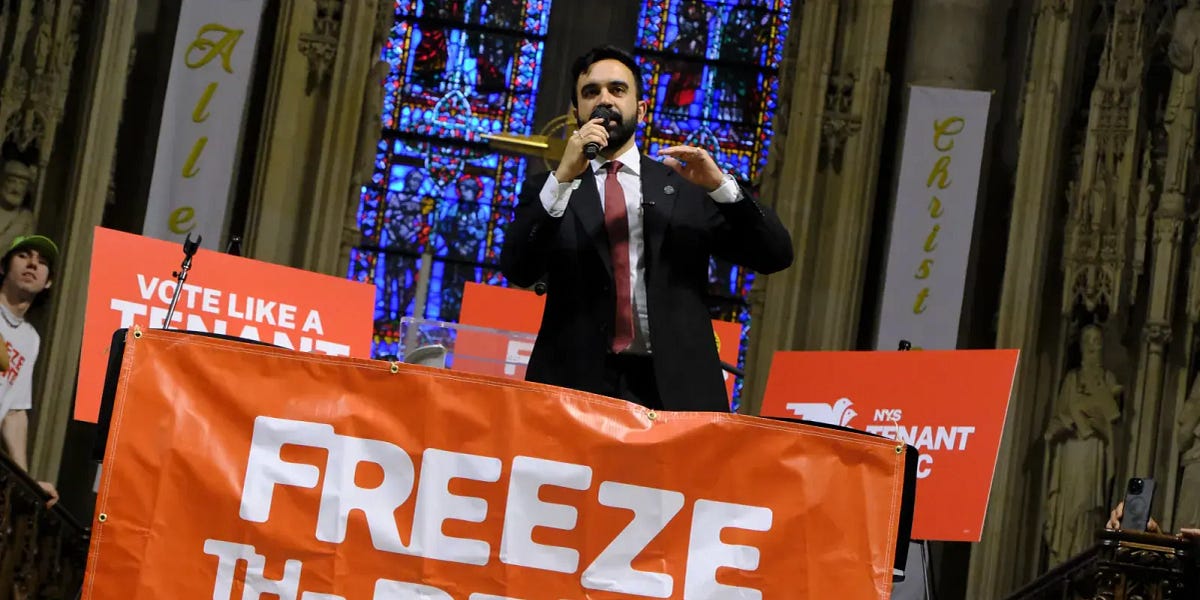
Mamdani’s Big Secret – Ken Klippenstein
The secret to Zohran Mamdani’s rise is his impracticality. Everyone agrees that the mayoral candidate’s message of affordability hits home, but his opponents and the major media are stuck fact-checking the New Yorker on whether any of his proposed solutions — like a “rent freeze” — can be implemented.
The mayor lacks the authority, the fact-checkers say. The landlords would never allow it. The rich will leave the city. And on and on. The admonition to be realistic is pretty much the response to anything and everything he says. Andrew Cuomo can’t stop talking about how impossible Mamdani’s proposals are, how inexperienced he is. But here’s the twist: the voters don’t really care. And they’re right.
Mamdani’s innovation isn’t that he talks about affordability, but how. He is willing to think big. So big that his detractors spent the whole election saying they were too big — criticisms that it’s now clear functioned as unpaid advertising for the Mamdani campaign. His critics might as well have been saying he was too bold, too visionary; better stick with the guy who has no vision and would be sure to deliver on it. That’s what their attacks sounded like.
In an interview with Jon Stewart this week, Mamdani summarized his ambitious proposals — freezing the rent, making buses free, universal childcare — as, he said, “a politics that can actually aspire for more than what you’re living through.” The problem, Mamdani went on to say, is that “politics has just become synonymous with an argument of: celebrate the little you have or lose that.”
When Stewart asked him directly about the “feasibility” of his ideas and the “reality” of politics, Mamdani replied that reality isn’t some fixed thing; it can be changed.
“The coalition you build can change that reality,” Mamdani said. “We changed it,” he said, referring to his primary election victory, adding: “we can keep changing it.”
His primary win was a spectacular repudiation of the pollsters, who with glossy charts and graphs try to induce the public to consent to middle-of-the-road, incrementalist politicians who give up before the negotiations have even started. Meanwhile? The median age of first-time homebuyers has soared from 33 years old during the pandemic to 38 in 2024. If that’s pragmatism, is it any surprise that no one’s interested?
“It’s not about money, it’s about will,” Mamdani told Stewart.
Americans (myself included) are sick of being told what isn’t possible by a political elite old enough to have lived through the splitting of the atom and the planting of a flag on the moon. Electric vehicles once deemed too cost prohibitive for consumers now crisscross the country, many driven by artificial intelligence previously thought to be the stuff of science fiction. On the cultural side, American approval of interracial marriage has risen from 4 percent in 1958 to 94 percent in 2021, per Gallup; and while around 30 percent of Americans supported gay marriage in the year 2000, now only about 30 percent oppose it.
Yet somehow, in the wealthiest country on earth, affordable housing just isn’t possible. That’s what the political establishment has tried for months to make New York voters think.
No, the mayor of New York doesn’t have a button labeled “rent freeze” he can press; but the idea that that means it can’t be done is a dog-ate-my-homework tier excuse. It’s the same excuse Democratic Minority Leader Hakeem Jeffries gave when he said, “What power do we have?,” as though a legislative majority is the only form of power politicians have.
Mamdani gets that there are other forms of power besides pressing a button or casting a vote. Instead of offering up the usual mealy-mouthed slop of incomprehensible, means-tested tax credits and the like, Mamdani went big with his rent freeze proposal. The two word phrase, Trump-like in its simplicity, became a viral meme and shorthand for his broader campaign for affordability. That’s power.
The former first buddy, Elon Musk, rose to fame on his own sweeping promises: of mass market electric cars, hyperloops, cave rescue submarines, terraforming Mars. Ridiculous as a lot of it was, it stood out in a sea of scolds saying nothing is possible.
Whatever you think of Donald Trump, he also thinks big. His war on immigration, cartels, Antifa, trade, deportations, the Federal Reserve and so on — you don’t have to like any of these things to see that he goes all out and all in no matter what the critics say. Earlier this week, the Department of Homeland Security announced that they had deported half a million “illegals” this year, with 1.6 million more having voluntarily left the country. That’s a lot of people. It’s a massive logistical undertaking if you think about it. Despite endless criticism, federal injunctions, bad press and foreign alarm, Trump keeps his foot on the gas.
There’s plenty to criticize. I certainly have. But can anyone say with a straight face that Trump isn’t hellbent on realizing his vision? Try to imagine him saying, “What power do we have?” The idea is absurd.
Mamdani is a sign that people want another vision but vision nonetheless.
“I think what we showed in many ways was that the days of endorsements deciding elections, those days have come to an end,” Mamdani also told Stewart. It was a call for other young people who reject the cult of Nothing Is Possible to run for office.
When Mamdani won the Democratic nomination in July, I reported at the time that the voters were done asking for permission from the party or the media or other self-appointed betters. It’s a theme I’ve seen in protest after protest that I’ve covered since: people aren’t waiting for the courts, the FBI, the Democratic Party or any other institutions. They’re putting faith in themselves.
— Edited by William M. Arkin
First Appeared on
Source link







